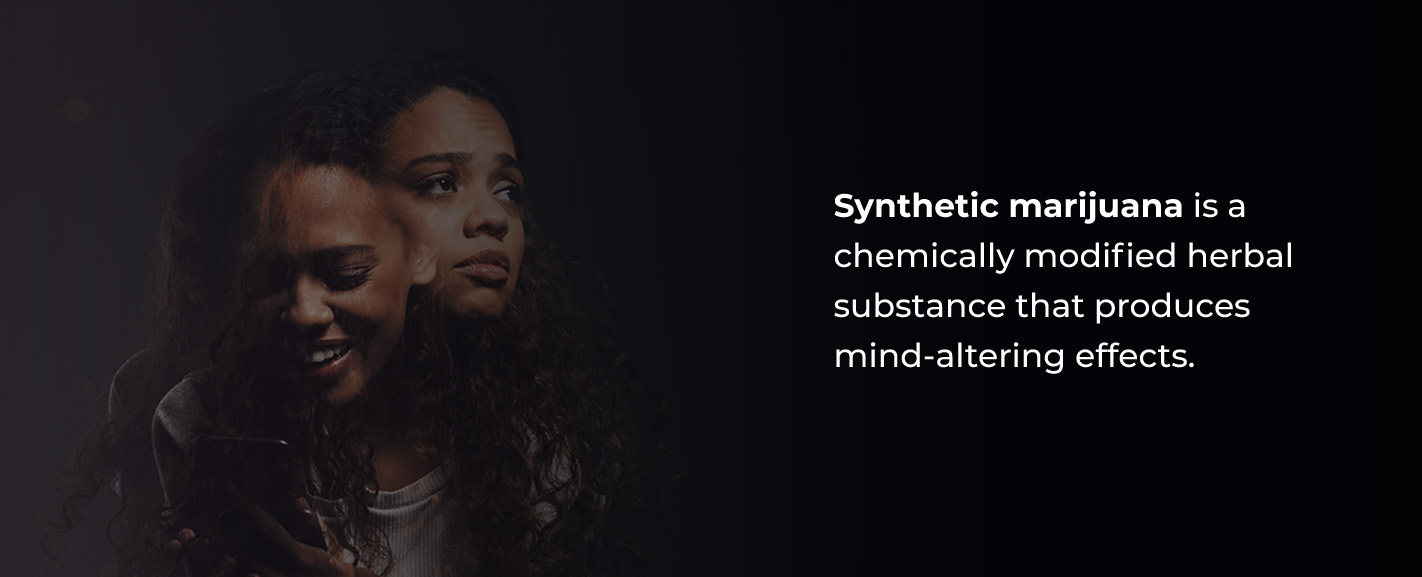
Synthetic marijuana is a chemically modified herbal substance that produces mind-altering effects. The chemicals are designed to be similar to delta-9-tetrahydrocannabinol (THC), the psychoactive ingredient in marijuana. Often sold in gas stations or online, synthetic cannabinoids are often sold under the guise of potpourri or herbal incense. Synthetic cannabinoids are generally meant to be smoked, though others can be ingested by eating.
There are several strains of synthetic cannabinoids that are constantly changing and produce unpredictable effects that can be dangerous and even life-threatening. Often, synthetic marijuana is mixed with other drugs or sold as other substances like opioids without the knowledge of dealers or users, making these products even riskier.
According to the Drug Enforcement Agency (DEA), most of the chemicals in synthetic marijuana are manufactured in Asia without regard for safety practices or quality control. They are then smuggled to the U.S., sprinkled in plant material and packaged for consumers to be smoked or inhaled in electronic cigarettes and other devices.
Common synthetic cannabinoids street names include:
Many types of synthetic marijuana are illegal. The Food and Drug Administration (FDA) lists 43 variants as Schedule I substances — the same category as drugs like heroin. Synthetic marijuana producers try to get around laws by using different ingredients or labeling products as “not for human consumption.”
Synthetic cannabinoids can cause effects similar to marijuana, such as altered perceptions, increased pleasure and relaxation. While some have noted synthetic marijuana produces satisfying results, it may also raise heart rate and blood pressure to dangerous levels.
Because K2 is officially intended for smoking or ingesting, using it at all is considered a form of drug misuse. And since synthetic drugs can be unpredictable, many may not realize what exactly is in the compound they are ingesting, increasing the potential for addiction or a dangerous interaction.

While anyone who uses synthetic cannabinoid products can develop an addiction, experts have noticed that certain people may be at more risk than others. Personal history and the length of time you take these substances can play a role, while the risk of substance use disorder seems to increase when paired with specific psychological, genetic and environmental factors:
The use of these products is similar to patterns seen in other addictive drugs. For instance, a disproportionate number of people addicted to synthetic cannabinoids are between the ages of 20 and 30, with men more likely than women to use these substances.
Other risk factors include low socioeconomic status, low self-esteem, poor stress management skills or aggressive behaviors at an early age. It’s also likely that those who use synthetic marijuana use other drugs, such as marijuana, tobacco and alcohol. Since many drug tests cannot detect the chemicals used in synthetic cannabinoids, many may use them to avoid positive drug screens performed for employment or in the criminal justice system.
Easy access to these drugs in stores, gas stations and novelty stores may also contribute to their use among younger people.
Environmental stress and triggers are common among those struggling with substance use disorder. For instance, those who have experienced or witnessed a traumatic event may use substances to cope with stress. The same can be said of those who live in poverty or who are subjected to community violence. Other examples of external factors that play a role in the development of addiction include:
Often, people who use drugs like K2 do so as a means to cope with distressing symptoms of a mental health condition. They may find that over time, synthetic cannabinoid products worsen their symptoms. Common co-occurring mental health disorders associated with Spice addiction include:
While you may find temporary euphoria or relaxation from Spice, the long-term effects can be life-threatening and detrimental in numerous ways. This dangerous substance can result in coma, overdose or death. That’s why medical and professional K2 addiction treatment is crucial to restoring your well-being.
By deciding to seek help, you’ll be welcomed by a team of highly trained physicians, therapists and fellow peers to support you through recovery. While overcoming addiction can be a long-term process, you’ll receive the tools and support needed to carry you through by attending residential treatment.
When you first enter a synthetic marijuana addiction treatment center, professionals will assess you medically to determine the appropriate care path for your needs. Physicians might design a plan to help you safely detox, while therapists and counselors can assist your ongoing recovery needs and goals.
The withdrawal process can take several weeks, depending on how long you’ve been using synthetic marijuana. Highly trained care professionals will administer the medication you need to taper substances from your body safely. This way, you can experience a smoother recovery process.
Medicines commonly used to treat withdrawal addiction include:
These medications can treat withdrawal symptoms like cravings, diarrhea, anxiety, flu-like symptoms, pain, sensitivity, irritability and stomach cramping. At the same time, patients struggling with co-occurring disorders might receive medication to treat the mental illness symptoms they’re experiencing.
Inpatient programs are highly beneficial for those who require intensive addiction treatment. Due to the dangerous chemical compounds used in synthetic marijuana, it’s tough to know how one’s body will react. Under the supervision of mental and medical professionals, individuals can receive immediate intervention to treat the onset of complications.
After medical detox or while gradually tapering substances, patients may be offered different forms of therapy to help them through the recovery process:
Outpatient care might follow inpatient care as a form of ongoing treatment or as a substitute for residential care. Outpatient programs allow patients to receive addiction treatment while simultaneously taking care of work, home or school obligations.
And since addiction is chronic, ongoing treatment can support long-term sobriety and wellness. For example, 12-step groups and other support groups can help those struggling with synthetic marijuana addiction. In these programs, you’ll have the support of others to help avoid relapse and achieve a happier, healthier lifestyle.
Synthetic cannabinoid products are a rising trend among people seeking an alternative to marijuana. With frequent usage, synthetic marijuana can cause psychological and physical addiction. This cycle can be challenging to escape and cause withdrawal syndrome and uncontrollable urges to use the drug no matter the consequences.
Since a wide variety of chemical compounds are used to create K2, the addiction symptoms can vary. The chemicals used to produce the effects were initially formulated for anything from cancer formulations to fertilizers. And since these chemicals aren’t approved for consumption, there’s no telling what adverse reactions a person might have.
Addiction to synthetic cannabinoids may be treated similarly to marijuana addiction. If you suspect that you or a loved one is struggling with synthetic marijuana addiction, there are a few signs you can look for to determine when to seek help.
If you are worried that someone you know is struggling with addiction, check them for any sudden changes in their physical health. The effects of synthetic marijuana can worsen with frequent usage and might include:
These symptoms can be similar to an overdose and become life-threatening. Additionally, if synthetic marijuana is combined with natural marijuana or opioids, the substances can interfere with each other and present dangerous symptoms for the person taking it. If you or a loved one is experiencing these symptoms, seek emergency medical services immediately.
Substance use disorder is a complex disease resulting in sudden behavioral changes. Common behavioral symptoms associated with Spice addiction include:
Since the cannabinoids in K2 bind to our brain receptors that control behavioral functions, physical aggression is often a common sign of addiction. Watch for unexpected behavioral changes, outbursts or mood swings if you suspect K2 addiction.
Unusual sleepiness and fatigue are other more apparent symptoms of this disease. Take note of any unusual changes in their energy levels. If they appear sluggish, take frequent naps or doze off randomly, these may be signs of substance misuse. Sleepiness can also cause problems in daily routines, leading to poor work or school performance, a lack of hygiene or declining exercise.
Examine your loved ones for any changes in their physical appearance. For instance, perhaps they’ve been wearing the same clothes for days, or their facial hair is unshaven. Body odor from neglecting to take care of hygiene is another red flag.
More behavioral red flags of addiction to watch out for include:
If you or someone you know is experiencing thoughts of self-harm or suicide, seek emergency help immediately.
Chronic users of synthetic cannabinoids have higher rates of comorbidity with depression and psychotic symptoms. These effects can cause feelings of detachment from one’s self and environment. While the initial results of synthetic marijuana can cause euphoria and a sense of well-being, they can quickly turn into psychosis and a host of other effects not expected by those who misuse this drug, such as:
With substance use disorder, many individuals risk developing another mental health disorder such as depression or anxiety. Symptoms of these conditions can cause addicted individuals to withdraw from friends and family members. Excessive drug use, agitation and irritability may also cause the individual with an addiction to lash out in anger or blame others for their problems. Over time, a rift may grow between themselves and their loved ones as they fall deeper into addiction.
All 50 states have reported adverse health effects in those using synthetic cannabinoids. Similarities exist between natural marijuana and manufactured, including how it’s ingested, though the effects of synthetic cannabis are generally much more powerful. Initial symptoms of synthetic marijuana use may appear similar to marijuana, though severe symptoms can take hold quickly and range from temporary mental changes to overdose or death.
Synthetic cannabinoid products contain substances found in chemicals like rat poison, which has been linked to several deaths and numerous hospitalizations. Since you never know what chemicals will be in the synthetic marijuana you ingest, individuals take a gamble on the harmful symptoms they may experience with each use. Even in small amounts, exposure to these substances can be addictive, toxic or even deadly.
Learn the short- and long-term effects of synthetic marijuana use if you or someone you care about is struggling:
Short-term effects and symptoms of synthetic marijuana mimic those of real marijuana, though they can worsen the longer the addiction continues. Initial effects might include enhanced mood, altered perception and relaxation. You may also experience:
If you’ve taken Spice without severe effects for months or years, you shouldn’t assume this will remain the case. Due to changing manufacturing processes and different brands selling unique formulas, effects are often unpredictable. Therefore, it’s essential to recognize the dangerous risks posed by both short- and long-term synthetic marijuana use.
When a person develops an addiction to Spice and continues to smoke, drink or inject it, the long-term effects can be damaging and long-lasting. Additionally, if synthetic marijuana is combined with real marijuana, the substances can interfere with each other and present dangerous symptoms for the person taking it. Those who take synthetic marijuana long-term risk damaging their relationships and careers, as well.
Examples of other long-term effects include:
Since synthetic marijuana is a relatively new substance, researchers haven’t had time to study its effects thoroughly. This makes it especially dangerous since side effects might not appear until years into the future.
A person may experience physical withdrawal when attempting to quit synthetic marijuana or have damage to the lungs, heart or blood vessels. They may even experience social issues stemming from drug misuse, such as relationship problems, legal or career issues or psychological changes. An individual may also experience financial difficulties as a result of these disruptions.
Research into the long-term brain effects of Spice is ever-evolving. Synthetic cannabis targets the same part of the brain as THC to provide a psychedelic high, though it can affect the brain much more powerfully and cause lasting damage. These changes in the brain include attention problems, memory issues and disruptions to executive and visual-spatial functions.
Additionally, synthetic marijuana can cause psychosis and suicidal ideation, resulting in many more emergency room visits than plant-based marijuana. Other psychological effects from K2 include:
As with other addictions, synthetic marijuana addiction can lead to withdrawal symptoms after the last dose. This occurs as the brain attempts to readjust from suddenly quitting these substances, resulting in painful and often damaging effects. These symptoms may be mild or severe, depending on the person and can cause:
Since withdrawal can be highly uncomfortable, many may continue to misuse synthetic marijuana to avoid it. As a result, it’s helpful to undergo medical supervision while withdrawing from synthetic cannabinoids.
An overdose occurs when a person uses too much of a drug and has a dangerous reaction that can cause severe symptoms or death.
Synthetic marijuana may cause elevated blood pressure, kidney damage, coma or reduced blood supply to the heart. Long-term use is associated with overdoses since individuals may use a higher and higher dose to achieve the same initial effects.
Deaths can also occur when synthetic opioids, such as fentanyl, are added to the mixture without the person knowing it. Other common overdose symptoms include:
It’s imperative that you seek medical attention immediately if a person displays the above signs of overdose following synthetic marijuana use. If left untreated, an overdose may result in a seizure, stroke, heart attack, coma, inability to breathe or unexpected death.

Addiction can feel isolating. When you make the bold decision to seek help, you’ll have a team of professionals on your side to help you overcome addiction. Residential treatment centers can provide stability, support and ongoing care to help maintain your sobriety and improve your quality of life.
A support system can significantly increase one’s chances of a successful recovery. However, many are not fortunate enough to have friends or family to lean on. One of the most incredible benefits of residential treatment is that they provide a community of peers and professionals eager to hear from you.
Most of the time, a compassionate environment is all a person needs to address their addiction and overcome their struggles. A sense of belonging is essential to anyone, and when you’re surrounded by others on the same path, you might feel less alone and more compelled to beat addiction.
Many who struggle with substance use disorder also suffer unpredictability in their home and social lives. This chaos can cause a person to adopt unhealthy coping mechanisms to deal with stress and anxiety. Structure and accountability are among the most significant advantages of treatment centers.
In residential programs, you’ll receive 24/7 supervision to help you avoid triggers. Your personalized care program will reflect your needs and offers much-needed structure to aid this process. Peers and medical professionals will also hold you accountable to continue down a healthy path. You can work to overcome your addiction through therapeutic approaches and the support of professionals.
More than just addiction recovery, treatment facilities focus on improving your overall mental and physical health. Substance use disorder can wreak havoc on the body and cause it to lose essential nutrients. If you quit substances when your body is in this state, you may be more likely to slip back into addiction. Because of this, you’ll find many addiction treatment centers that provide nutritious meals to help you restore your mind and body.
Treatment centers also encourage exercise and offer a wide range of classes and exciting group activities. You’ll notice positive mood and physical health changes as you continue treatment. Many of these hobbies will become helpful tools to avoid addiction triggers and remain sober post-treatment. Recreational activities provided at most rehab centers include:
Answers to commonly asked questions about synthetic marijuana treatment:
Synthetic cannabis is often sold in attractive and colorful packages, referred to by various names, including:
New versions continue to appear on the market as manufacturers change the chemical compounds to find ways around existing laws. The herbal mixture in these packets resembles potpourri and is often sold as herbal incense.
Medical professionals might use Suboxone or Vivitrol to alleviate withdrawal symptoms. Since the effects of synthetic marijuana are unpredictable, patients are monitored 24/7 to treat potential complications immediately. And since research is still evolving on synthetic marijuana treatment, patients will first need to undergo a professional evaluation to determine the appropriate medications to help address symptoms.
If a loved one or someone you know has begun using synthetic marijuana, you may feel concerned about their physical health, mental state and future. While it’s impossible to make someone seek treatment, extending your care and compassion can give them the confidence to find help and receive the treatment needed to overcome these struggles.
Explore the latest resources from Gateway Foundation.
We use cookies to give you the best experience on our website. If you continue without changing your cookie settings, we assume that you consent to our use of cookies on this device. You can change your cookie settings at any time but if you do, you may lose some functionality on our website. More information can be found in our Privacy Policy.